TOM FRANCIS
REGRETS THIS ALREADY
Hello! I'm Tom. I'm a game designer, writer, and programmer on Gunpoint, Heat Signature, and Tactical Breach Wizards. Here's some more info on all the games I've worked on, here are the videos I make on YouTube, and here are two short stories I wrote for the Machine of Death collections.
Theme
By me. Uses Adaptive Images by Matt Wilcox.
Search
Things I Forgot To Talk About Round-Up

Futurama: Bender’s Big Score: if you’ve seen Score and felt that it’s a little heavy on the fan-service – hi. I’m one of those fans it was servicing, and it did it very well. I didn’t need that much Leeloo, and the songs were needless and clumsy, but other than that it was joyous.
I’m the sort of fan who gets an enormous kick out of the new theme tune, the triumph of bureaucracy, the explanation for how Gore lost the election, the obsessive retconning of the pilot episode’s pivotal moment, the cyclic timeline mathematics and the titular payoff at the very end. Speaking of the theme tune, have you heard the 1967 original? It’s surprisingly awesome.

“Are you free?”
“You have no idea.”
Dexter Season Finale: the only thing wrong with this season of Dexter (apart from the unaccountable soap-opera interlude that was Rita’s mother) is a certain character lapsing into a hideous crazy-stalker stereotype. But the finale got so much mileage out of the mess this created that I can almost forgive it. The scene with three people and a large black bag was almost unbearable to watch. More spoilerific discussion should probably go in the original comments thread.
But yes, fantastic. The leadup to this over the last handful of episodes is the best Dexter has ever been, and Dexter is itself near-perfect television.

“Let’s see if the best bed in Kaer Morhen can hold us!”
The Witcher: broken sexist porno that’s coming up in a lot of game-of-the-year lists, and got huge review scores everywhere but with us. You play a badly scarred grey-haired old man in leather trousers, to whom a procession of identically-shaped redheads surrender themselves sexually after three lines of astonishingly bad dialogue. Post-deed, you are awarded an achievement souvenir card showing the girl naked, just in case you didn’t already feel like a pathetic mysognist.
Somehow it’s even more wretched than the despicable Leisure Suit Larry games – the last of which revolved around date rape. The fact that Larry’s love interests even needed to be date-raped before they’d sleep with the idiot hero automatically makes them stronger characters than the Witcher’s.
It’s not that I can’t imagine what people see in the Witcher – I haven’t played it through, maybe it gets amazing after four hours of insufferable dross. I’m just appalled at what they can ignore. The huge script cutbacks before release have been achieved by simply deleting swathes of lines, so conversations are riddled with bizarre, glaring holes that not just make for abysmal fiction, but in many cases render events truly incomprehensible.

“Laurent ran guns for the resistance.”
“Which resistance?”
“He won’t say – apparently they didn’t win.”
Ratatouille: I hate to be down on such a sweet film, but I’m so tired of that nervous kid cliché and the angry boss who’s supposed to be funny because he’s short. Brad Bird has uncharacteristically little to add to those grating, ancient stereotypes, and the central conceit is just surreal.
The premise is a rat who can cook, and a kitchen boy who cannot, but the film has no workable idea for how the two can collaborate. It ends up inventing a physiological mechanic so utterly nonsensical that it’s downright creepy to watch.
The rat and dough physics modelling is fantastic, and it made me laugh perhaps twice, but it’s so far from the spark of The Incredibles.
Duke Nukem Forever Trailer: after ten years of development, the first movie of the incarnation that’s actually likely to be released has come out. It features no dialogue until, at the end, protagonist Nukem stands up and says, essentially, “I want to shit on you.”
I am at a loss.
Gollum Beat Box Like You Never Seen
|
Yo my name is Gimli and I’m a fucking dwarf Now all you Boffins and Bolgers, Bracegirdles and Proudfeet Yo, I’m harder than a Mithril coat |
The Order of the Phoenix
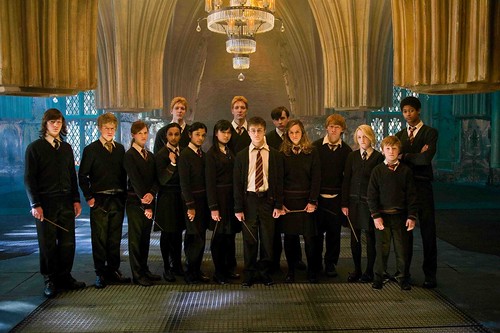
Right, that’s it. If Transformers isn’t any good on Sunday, I’m giving up on fun-but-dumb films altogether – I no longer enjoy them. I didn’t like the latest Pirates of the Carribean, I hated Die Hard 4, and last night even Harry Potter left me cold. My brain just doesn’t have enough to do during these, which is really saying something given that I enjoyed Gerry, a film where the memorable quotes page on IMDB constitutes the entire script, and the only two characters have the same name.
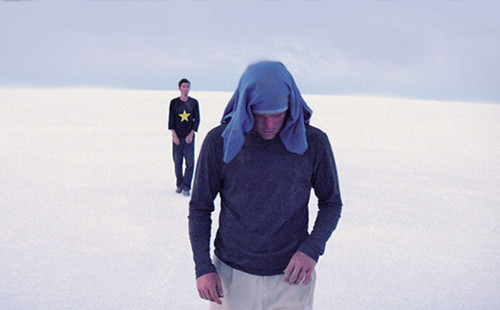
So I either think about other things entirely (is this seating arrangement socially optimal? Almost, I decided), or pick holes. That CGI object isn’t correctly synced with the actor’s hand. The next line is going to be “Something to fight for.” Emma Watson can only act during even-numbered minutes of the odd-numbered Harry Potter films.
When I read the same story in book form, I cared about everything. And really, it’s a story that suits cinema better than literature in a lot of ways – the fizz and crackle of wizardly battling comes across very poorly in text. But this director’s concept of being faithful to the book seems to be checking all the subplot boxes, which is impossible to do well in under six hours. So the three most affecting elements of Phoenix are all glossed over with almost comic brevity. Those being:
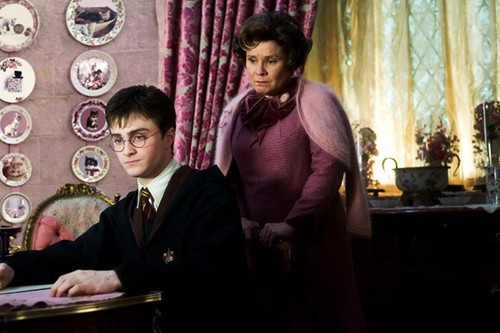
-
Delores Umbridge’s torture: I thought the actress here was great at portraying her syrupy strain of institutionalised evil, but the real potency of the character comes from the horror of what she makes Harry do. He has to claw her words in his own flesh over and over and over again every night, writing in blood over his scar tissue before it can heal. It’s the repetition that’s galling – that’s why it’s such a wonderfully fiendish play on the familiar punishment of ‘doing lines’ – but in the film we see him do it once. Misses the point, dissolves the horror, defangs Delores.
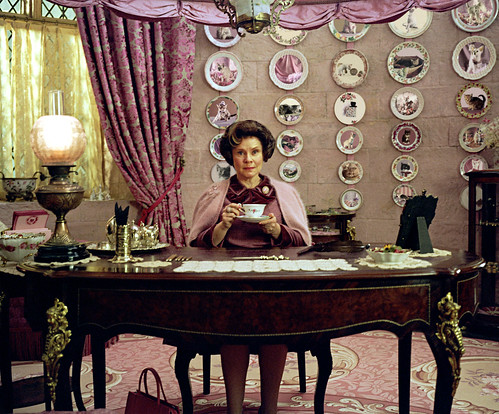
- Neville Longbottom becoming more than comic relief: after mocking his idiocy for four whole books, Rowling adds a streak of genuine tragedy to Neville, and a sad little stirring of redemption. It’s an easy pluck of your heartstrings, but a resounding one. Here’s how this story is told in the film:
(Neville Longbottom is standing in front a wall looking at a newspaper clipping that shows a photo of his parents. Harry joins him)
Neville: Hi Harry my parents were killed by Bellatrix LeStrange after she tortured them for information I’m proud to be their son but worried that I won’t live up to their good name thanks bye.
Fin
- Harry’s increasingly conflicted relationship with Snape: the entertaining thing about Snape as a villain is that he isn’t one, he’s just an extremely unpleasant good guy. Or so Dumbledore insists, and since he’s virtually God in the Harry Potter universe, we tend to trust his word over even Harry’s judgement.
In Phoenix, Snape is the only one able to teach Harry to defend his mind from Voldemort’s invasive telepathy, an arrangement they both resent enormously. But also a great device not only to force Harry to see Snape as a good guy, but to let both of them find out the truth about each other.
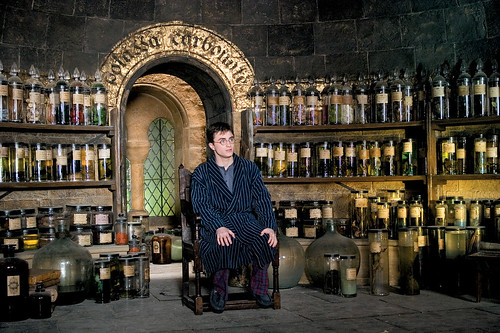
By repeatedly invading Harry’s thoughts, Snape quietly has to face that most of his conspiracy theories about Harry have been wrong. But when Harry inadvertantly gets into Snape’s mind, he has to face that more or less every disparaging thing Snape has said about Harry’s father is true, and a lot worse besides. This is a huge deal, a genuinely quite brave twist, and the most devastating thing that’s happened to Harry so far. His only reason for enduring the increasingly horrible things life puts him through is this dream of living up to the example of his parents, and avenging them.
We do get the moment of discovery itself in the film, inside Snape’s mind, but it’s topped and tailed: it happens almost immediately after the lessons are started, so we get nothing of the way Harry and Snape’s relationship has changed, which is probably the most interesting thing in the book. And we get nothing of the aftermath, which is easily the most important thing in the book.
It feels like they think fans are more interested in seeing every subplot paid lip-service than in any of them being done justice. I could be entirely happy with a film of Phoenix that left out all three of my favourite things about the book, if it just did anything else well. If it just had some downtime, some of the day-to-day stuff that lets you get to like the characters before they get knocked around, I’d care.
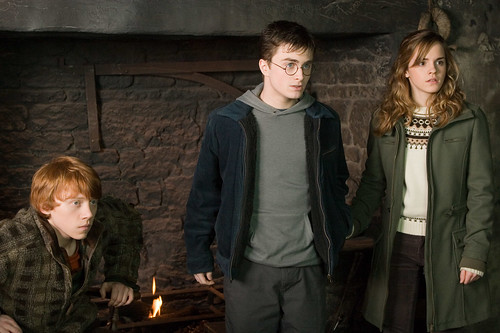
The fun of Harry Potter is never the plots, it’s getting to live in their world for a bit. It’s enduring the Dursley’s long enough at the start of each book to be relieved and excited to get back to Hogwarts and his friends. It’s butter-beer in Hogsmeade, non-plot-critical Quidditch. This ruthless, workmanlike cramming the films are so hellbent on is wrecking the magic.
Visually it’s marvelous; another adoring tribute to the universe that matches my imagination beautifully. The effects guys really do care about doing everything justice, and they’ve got the creative juice to manage it all and more. That just makes it more irritating that they’re still using directors who waste it incompetently, when in Alfonso Cuaron they’ve already found the guy who can give the rest of film the character its effects already have.
This Month In Terrible, Part 2: London Olympics Logo

It’s depressing to think that in my life, I will never write anything as funny as this logo. What the hell is it? The first thing I thought when I saw it, once I’d dried my eyes, was “What does the R stand for?” If the oblique angles that make up 95% of this image are supposed to represent the digits of 2012, what’s this:

It’s so typically British to have the only bit we could be proud of – that it’s in England – written in all-lower case seventies sci-fi script on the underside of something that might once have been a two.
Also hilariously dismal and quintessentially British is the ad they made to capture the spirit of these Olympic Games. It shows shining examples of the heights of excellence that the British spirit can achieve: a woman who’s managed to slim down to a mere fourteen stone, a disabled boy who can now ride horse without falling off more than three times, and a mother who, when she really tries, can cycle almost as fast as an OAP-buggy. It ends by speculating that she might one day be good enough to hand a bottle of water to a real cyclist. To sleep, perchance to dream.
Not The Finale Post
I have so many season finales to watch now, it’s like the end of the world. The only one I’ve seen so far is Heroes, which I will refrain from commenting on here until I’ve thought of a better way to deal with the spoilers problem.
This is why this is not the post about season finales. Instead, it is about these things:
Pirates of the Caribbean 3: Dead Man’s World Of End-Sparrow. In one of those things that didn’t really happen to me much when I worked in a warehouse building skateboards, I was taken to a preview screening of this on Wednesday in a stretch limo with free champagne, which I did my level best to pour on the editor of Disney Girl magazine. It is, I thought, ‘okay’. I would stretch to ‘quite good’ if this was the first one, but it lacks so much of the fun of the second that I find it hard to recommend. Particularly since everyone hated the second.
The first one was the zombie pirates one, and was good because it was breezier and funnier than you expected. The second was the fish pirates one and was great for its absurdly long, wildly overdone, bloody-minded physics-driven set pieces on gorgeous tropical islands. The third is about a big book of rules and some crabs that look like rocks.
None of them make a whole lot of sense, and I don’t recall what actually happened, plot-wise, in any of them (at the start of 3, everyone is alive and roaming around, so I assume nothing of import happened in the last two). But the third one doesn’t use its license to be absurd to do anything very fun. All the spectacular bits are just ship battles, which we’ve seen in some depth before.
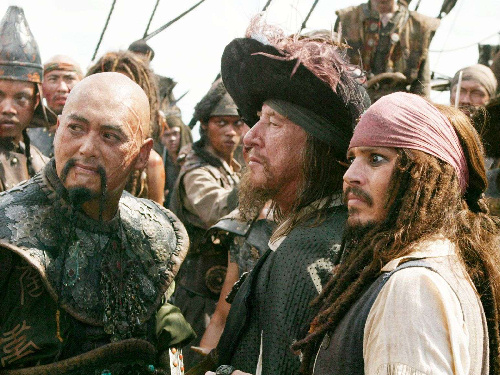
I actually love ship battles, but they can’t hold my attention for long in dumb films. The reason they’re exciting is that they’re so physical – you can see the cannonballs, you can see which bits of the ships they smash, the damage is all evident and so the outcome is believable. In dumb films, such as this one, captains are idiots and the hero’s ship wins because it’s made of magic.
At one point a billion-strong armada retreat from two enemy ships, because they destroyed the flagship (because, for no reason, the captain couldn’t decide whether to fire or not). John, who loved it, argues that this is normal film logic, but the whole setup for the scene is “They can take this guy, but what do they do about the billion ships?” It’s hard to enjoy a dumb film about naval combat, politics and trickery if you’ve ever seen Hornblower, which was eight non-dumb films about naval combat, politics and trickery, with characters it is possible – nay, easy – to like.
Aside: Geoffrey Rush is still such a watchable pirate. While Depp’s drunken eyebrow-work on Sparrow gets tiresome, Rush can still just say “Arr” or a sentence of the form “X be Y”, and I am immediately happy.
Score: okay.

The reaction to my Galactic Civilizations 2 War Diary: which has been surreal. This is a ten-thousand word account of a single match of an expansion pack to a little-known turn-based strategy game with poor graphics, and no-one seems to mind. It’s not the hits or links that it got, surprising as they were, but the extraordinary comments. I just read someone saying- well, I’ll quote: “My brother and I would read the blog, then get together to discuss what he was doing right, what he was doing wrong, and what he needed to do to win.” This makes me feel amazing.
I like very much that I work on a magazine where I’m allowed to give stupid ideas like this a try. I did most of it at home or after work, but only because I love writing this kind of stuff so much. I had some New Years Objectives this year, one of which was to write something that got the same kind of reaction as my report on the Eve Online assassins – which has always frustrated me by being better-received than almost everything I’ve written since. This got a different kind of reaction altogether.
Comments at PC Gamer
Comments at Joystiq
Comments at the GalCiv site
Comments at Kotaku

Facebook: it’s like social networking, except that I like it. I’m on everything – MySpace, LiveJournal, Blogger, Twitter, WordPress, Technorati, Tumblr, Flickr, Last.fm – but Facebook is the only one that seems really smartly designed in terms of how it connects you to people. It’s good at knowing what you’ll find interesting about what your friends are up to (almost anything), so the main news feed you get from it is incredibly fast-flowing and rich in interesting goings-on.
Now I have to watch TV.
Invasion of the Body Snatchers
I saw Spiderman 3 yesterday, so here’s my review of Invasion of the Body Snatchers. It – unlike Spiderman 3 – is fantastic.
It’s the 1978 remake I’m talking about, with Donald Sutherland, Leonard Nimoy and a very young and very excellent Jeff Goldblum. It is a strange concept to me that a movie released before I was born could be a modernisation of something even older (were eyes even invented before then? Mine weren’t), but from what little I know of the original, it doesn’t seem like a remake the way they do them today. It’s darker, truer to its premise and closer to the original novel than the first film version, almost a de-Hollywoodisation by comparison.
Oh, I should probably explain why I’m suddenly talking about an incredibly well-known 1978 classic sci-fi film. Er, it was on TV last night. And I hadn’t seen it before, and thought I should, even though I rarely like old films, and I even less often like old films that are considered classics. Classic seems to mean ‘no longer any good’. I have some classic cheese in my fridge.
But I was amazed by this, and more importantly horrified by it – I think more so than at the Ring films. The cultural touchstone it spawned was about this idea of everyone going about business as usual, but somehow not being themselves, lacking emotion. That’s not very scary. It doesn’t get scary until so many humans have been replaced by ‘pod people’ that the humans are trying to blend in with the pod people rather than vice versa.
People have to pretend to be people pretending to be people. The film is never explicit about how many have changed, partly because the ambiguity is part of the menace, but there is a distinct turning point. Because from that point on, whenever a pod person discovers a human in public, they point at them and scream.

It feeds on two potent psychological tricks that don’t get used enough: firstly, that there’s nothing more horrifying than something that’s absolutely horrified of you. And secondly, the scariest images are also the most absurd – and potentially comic.
I came across an incredibly spoilerific screenshot from the film while digging out the image above (which is not spoilerific – it never happens in the film), which captures the most brilliant, horrible and chilling moment, but just looks hilarious out of context. It’s hard to imagine a more modern film daring to do something so easy to mock, but Body Snatchers leads up to it gradually and creepily, so that when you’re actually watching it (alone, or with people who can shut the hell up), it’s terrifying.
There’s also an extraordinary scene where pod people hatch all around Donald Sutherland as he sleeps in a deckchair outside, all born adult but malformed, and they’re oddly convincing. They make odd noises as they hatch, but not the bland sci-fi squelching almost every other film involving aliens succumbs to. It’s remarkable what a difference that makes – these things were done with puppets thirty years ago, and they’re creepier than any CGI I’ve seen.
Then there’s the dog thing. I have no earthly idea what the dog thing is all about. The film is otherwise very consistent, and even corrects some nonsenses of the original. Then there’s a dog thing, and it’s sudden and unexplained and utterly horrible, but again, probably just funny out of context. I would think if you have seen the film, it would have been a long time ago, so I’d be intrigued to know if anyone remembers the dog thing.
Primer

I use Amazon.co.uk’s DVD rental-by-post thing, which is one where you can keep the DVD as long as you like while you’re subscribed. This is good because they can’t have Primer back yet. After watching it, I spent forty minutes reading Wikipedia’s superb dissection of the film’s nine distinct timelines, featuring eleven iterations of the two main characters and a flow chart, then I watched it again with the director’s commentary on. Then I watched it again. Craig raises the objection that something ought to be comprehensible to the human mind on first viewing, and it’s true that this is not. I have a certain amount of time for enjoyably dumb films, but to me this is what entertainment should be: something beyond you, not pandering to you, something that both needs and deserves to be explored and understood.
It’s written by, directed by, produced by, scored by, edited by, partly filmed by and stars a former engineer who’d never written, directed, produced, scored, edited, partly filmed or acted in a film before, for $7,000, with a crew of six and only one trained actor. Its creator’s mum and dad supplied the food. And after watching it, you have to wonder why anyone needs more than that to make a film that doesn’t call for any particular special effects, because none of it really shows. It’s set in real locations which are free and appropriate, mostly with available light which makes it look realistic, and most of the people are people rather than actors, which makes them more convincing because actors don’t act like people anyway. It took two-hundred and fifty-six people and five million dollars to make Memento, a similarly stark and intricate film, and I’m not sure why.
It helps that Primer is about a couple of hi-tech engineers who run a tiny electronics business from their garages on top of their day jobs. In case the thing about timelines earlier didn’t give it away, it’s about time-travel. But it’s unique among time-travel movies in being almost entirely convincing, in about three ways:
1. If time-travel is ever discovered, it will be discovered like this. In Primer it’s a side-effect of a tweaked version of an existing type of machine, and they almost don’t notice it does it. It’s only by chance that one of them stumbles across the fact that the Weeble whose weight they’ve been successfully reducing has accumulated six years’ worth of mildew in its brief time inside. A long and quite slow-moving chunk of the film leads up to this in a very natural way, and the cautious excitement of intelligent nerds making something work is so well-invoked that I found myself quite thrilled when just they got this high-temperature superconductor to work at all, let alone travel through time.
2. This actually makes sense. It effortlessly explains all three usual objections to time-travel scenarios: a) Why haven’t we seen travellers from the future already? The furthest these machines can take you back is to the moment you switched them on. b) Why don’t you appear in empty space when you come out in your destination time, given that your starting point was elsewhere on the Earth’s orbit? You stay physically within these machines as you travel back in time, and you do travel back in time rather than teleport to a specific earlier point: you live backwards in the box while the rest of the world lives forwards. And c) Whatever you do in the past will already have been done in the past, removing the reason for you to have gone back in the first-place. Here, changing the past changes the past of the timeline you’re now in, which is no longer the same as the one you came from. It’s still useful because you can live in this new one, and your self here is planning on getting in a time-travel box which will remove him from it.
3. It’s not glamourous. They don’t whoop and jump around the room when it works. There’s no montage where they win the lottery and get drunk. It’s a hard, weird process to go back: you have to spend as much time as you want to travel inside an argon-flooded coffin, and there are side-effects. These guys try it for six hours a day, make measured profits on the stock market, and carefully isolate themselves from their contemporary dupes.
The plot itself is focussed exclusively on the use of these devices and the relationship between the friends who invented them. There are wives, children, friends and an outside character who plays an enormously important role later on, but none of them get more than a minute of screentime, and we never even find out why the outside character does what he does – simply because the two friends themselves don’t either. That level of focus is essential to detail the incredibly dense web of events that unfold over just a few days of traditional time, and probably only a week or so from the perspective of the most time-travelled character (whose identity would be a huge spoiler at this point).
25th Hour
I inflicted both Die Hard 2 and Legends Of The Fall on myself this weekend, both abysmal wastes of time. I would like to suggest that Die Hard 2 is to Die Hard what The Phantom Menace is to The Empire Strikes Back. I would further put it to you that most of the relentless misfortunes of the imbecilic characters in Legends Of The Fall might have been averted if there had been more than one woman in the film’s universe. I was forced to watch both because I was too tired to move once they had started, and the remote was way over there.
But! Bank holiday weekend films can end on a high note! 25th Hour, 10pm, on BBC Two. Profoundly worth watching, primarily for the hilarious DEA agent duo. But also because of Ed Norton, Philip Seymour Hoffman and The Other Guy as horrifically mismatched friends. It’s mildly well-known for Ed Norton’s character’s reflection’s racist rant about New Yorkers, which is riveting in the same way as a car accident.
I have to stop writing now, or the film will actually start before I post this, and the one person who would otherwise have seen this between now and it being too late would not in fact see it at all, and it would be too late.
Edit: That DEA Agent search in full:
AGENT BRZOWSKI
This sofa is not very comfortable.
AGENT CUNNINGHAM
Maybe it’s your posture. Posture’s very important.
AGENT BRZOWSKI
No, it’s this Castro convertible. It’s very uncomfortable. It’s kinda… kinda lumpy.
MONTY
Get it over with.
AGENT BRZOWSKI
I just don’t understand. It looks like such a nice sofa. How much did you pay for this sofa, Ms Riviera?
…
Maybe it’s the padding.
AGENT CUNNINGHAM
Ho yeah, could be the padding.
AGENT BRZOWSKI
Probably the padding. Yeah, there’s something lumpy in here, Mr. Brogan.
…
Sheeeeeeeit.
You know, it’s a good thing I found this? It’ll make your sofa much more comfortable to sit on.
Serenity
Opera is rubbish. Space opera is only mildly better. No-one turns out to be anyone’s father in Serenity; royalty are not involved. There isn’t even a struggle between good and evil, and it has characters instead of charicatures. That, vaguely, is why it’s better than Star Wars.
I’m sorry, I love sci-fi, I happily endure the trashy bits and the awful acting, and lightsabers are awesome; but ultimately, I like things that are actually good. I prefer to genuinely enjoy something than keep my tongue in my cheek. Specifically, it was when I was crying, laughing and biting my fist at the same time that I decided Serenity is better than everything else.
The crying bit was the only one that owed itself partially to the preceding series – no-one could watch the film and not like Wash by that point, but for Firefly fans he’s an old friend, and his loss is absolutely wrenching; all the more so for being completely unexpected (sorry, people who ignore spoiler warnings). Usually when a character dies on-screen I’m praying we’re not going to be insulted by some flimsy device to bring them back or pretend it didn’t happen – revealing it to be a cheap trick to toy with an emotional involvement it never earned in the first place. This was the first time I was hoping for one of those, however dumb – it was the first time I’ve cared more about the character than the film itself.
Probably the most audacious part of Wash’s death isn’t the permanent loss of by far the best character, it’s that you’re laughing when it happens. If the surprise death in LA Confidential is jarringly sudden, it pales in comparison to this. Wash dies mid-gag – a good gag at that – and immediately after doing something brilliant. It’s cruel, but it’s not callous or cynical writing – it’s an acknowledgement that main characters don’t automatically get fifteen seconds of extra life after fatal incidents, that they don’t always go out sacrificing themselves, that the timing isn’t predictable. Violent death is quick and horrible.
There’s barely a minute’s grace before the jokes start again. It ought to feel incongruous, but then the humour was never flippant to begin with – most of the jokes revolve around the fact that they’re all going to die almost immediately. It was always a diversionary device for the characters with the funniest lines, so it’s never more appropriate than in the wake of a tragedy. As ever, it’s Wash’s inherent reasonableness and Jayne’s nihilistically pragmatic approach to machoism that compete for the most laughs, and you have to wonder again why no other sci-fi is anything like this funny.
The tension – the fist-biting bit of my emotional cocktail – is partly down to the stepping up of the scale of the story. Firefly was always about a bunch of fugitives trying to stay off the radar and make money; Serenity is the first time their story has spilled over into something affecting the whole universe. The personal scale of Firefly’s plots was part of its charm, but Serenity proves that a plot which connects that to the truly epic can be even more seductive. And the perfect link between the two has been very carefully set up throughout the series: River. It always made it clear that she was significant in some way, finally discovering this significance – and its magnitude – brings Serenity’s universe into focus.
The Alliance isn’t cosmetically unlike Star Wars’ Empire, but the context is crucial – in Serenity, the Rebellion’s already been quashed. There’s no war, if you don’t like them you just have to stay the hell away from anything resembling quality of life. And though the Alliance is the bad guy, it’s not the only one, and in the intro to Serenity you actually get their perspective (and it’s not that much less reasonable than the outlook of a patriotic country today). When the crew’s ploy forces the Alliance to face their figurative demons literally, both Mal and his nemesis lament the loss of innocent life – an unpleasantness other sci-fi feebly avoids with clones, drones and aliens.
That nemesis is another application of the fierce intelligence with which Serenity hacks away at sci-fi convention. An empire is led by bureaucrats, not a samurai and an electric pensioner. The guy you send to capture a sensitive target is your best black ops man – neither a freelancer nor a government official. Someone who is actually employed to do this sort of thing, and ruthlessly, spectacularly efficient at it. He’s stylish, certainly – the killing of the scientist in his first scene is one of the most macabre screen assassinations in memory – but it’s an elegant application of necessary force rather than a superfluous flourish. And when it comes to killing everyone the targets have ever known, that luxury is dropped without hesitation. Like every good agent, his violence is committed in a passionate belief in the cause, and the same understanding of the necessity of secrets, under-handedness and technically illegal operations that a real spy needs. This guy reassures his victims that they’ve lead a virtuous life before he executes them. He’s not evil, not even cruel, just ruthless.
It’s also brilliantly refreshing to see an a bad guy who, when the girl sneaks up behind him during the hero-nemesis fight, turns round and kicks her really hard. Nemeses are sick of getting knocked out with vases! If you keep doing that shit, women of action films, they’re going to have to hit you quite hard!
It’s not just rare for sci-fi to be this intelligent, it’s rare for something this intelligent to be so emotional. Memento and LA Confidential, though unquestionably cleverer than Serenity and utterly gripping, never put my engagement with the excellent characters to use in making me feel things. Or at least, what they made me feel now seems vague and academic compared to the wonderful trauma of watching Serenity. It has brains, heart, and space zombies.
State Of Things
I’d just like to say, this comments thing has been awesome. Thanks to everyone who’s added words to this page – they’ve been consistently clever and well-spelt. I knew you were all awesome, of course – I looked at my stats very carefully before deciding to have comments on the main page. According to the percentage of you using Firefox, James readers are approximately 1800% cooler than the general populace.
To celebrate I have worked out how to make Firefox realise I have an RSS feed, so that little orange broadcast icon should appear down the bottom. You can add it at as a Live Bookmark, or cram this link into a feed reader. You can even feed that feed to your personal Google page.
I am excited. We are about to get hit by a tsunami of amazingness, and I don’t see it stopping before the end of the year. Next month sees the return of Lost and The OC – the two most addictive programmes ever – and finishes off with the release of Serenity, the film of the third-best series ever, and a pretty much guaranteed entry into my elitist top films list. October is FEAR month, and given that I’ve now played the bizarrely early demo through about thirty-six times, I see myself getting lost in that pretty hard. Somewhere in that interim Hitman: Blood Money and Call Of Duty 2 are both due, but take that with a pinch of salt until you hear it from someone who knows anything. Contracts left a bitter taste in my mouth, so excitement over Blood Money is running low, and Call Of Duty 2’s promise is basically that it’ll put you through living hell, but both are bound to be an experience. I feel like I am owed Dreamfall fairly soon, but I don’t know where that’s coming from.
Let’s hope all that happens before mid-November, because in all probability subsequent events will be rendered irrelevant. I will not be playing other games for a few months. For the purposes of that claim, ‘reality’ counts as a game. I am waiting, of course, longing for sweet, sweet Oblivion. Which has Wonder Woman in it.
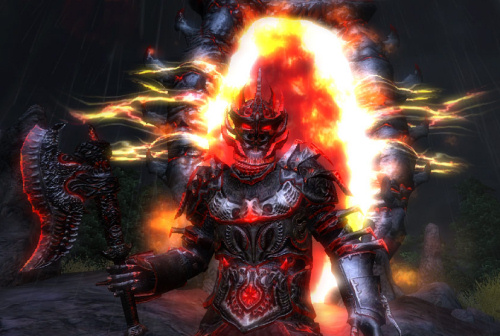
Mulholland Drive
Genre: surrealist psychological horror.
Stars: Naomi Watts (American version of Ring), Laura Harring, Justin Theroux (apparently an Irish bad guy in the second Charlie’s Angels film).
Plot: a partially failed actress is dumped by the girlfriend who got her the few roles she ever had, for a man, and hires a hitman to have her killed. In her grief and guilt, she tries to reimagine her life in Hollywood with showbusiness gloss, but her dreams are haunted both by reality and terrifying symbols of death and dementia.
Why It’s Great:
- The plot is more complex than the top two films combined in some sort of really complex way: it’s probably not possible for a human mind to grasp it on first viewing, and because of that it – like any David Lynch film – has been made artistically beautiful enough to work as a rationally unintelligible surrealist piece.
- Dream is entangled almost inextricably with reality.
- Dozens of ingenious crossovers and quirks crop up once you make sense of it.
Adaptation

Genre: forget about it.
Stars: Nicholas Cage, Nicholas Cage, Meryl Streep, Chris Cooper (the homophobic dad in American Beauty).
Plot: tempting to say ‘forget about it’ again, but I’ll give it a go: a woman writes an article about a guy who steals rare orchids from nature reserves. The article is very popular, and a publisher asks her to adapt it into a book. She does, and calls it, like the article, The Orchid Thief. The book is very popular, and a producer asks screenwriter Charlie Kaufman to adapt it into a film. He tries, but can’t capture what he likes about it, and obsesses over his failure, ultimately writing first the entire history of the Earth, then himself, into the plot. Meanwhile, his admiring, friendly brother Donald takes up screenwriting himself, after attending a quicky course on it, exasperating his brother by coming up with lower-brow ideas typical of modern cinema and seeking Charlie’s approval. It’d take me about another paragraph of that size to explain the rest of the plot, then two or three more to qualify how much of it is actually true, and that the film he’s writing is in fact the film he’s in, which evolves dynamically as he, the character in it, makes decisions about how to save the screenplay he’s writing from either pretentiousness or never being finished. Instead, I just told you the plot of the plot summary I’d write if I was going to write the rest of this plot summary, but I did it rather cleverly within the plot summary itself, so perhaps I should have included the plot of the above plot summary before the plot of the rest of the summary, which doesn’t exist. I think I’m sooo goddamn clever.
By the way, I wasn’t just mocking myself there to mirror the relentless self-deprecation that consumes Charlie Kaufman when he realises what he’s done, I really do think what I did there was pathetic. If I wanted to mimic his self-deprecation, I’d do something like… well, see the last section called ‘Something Like…’
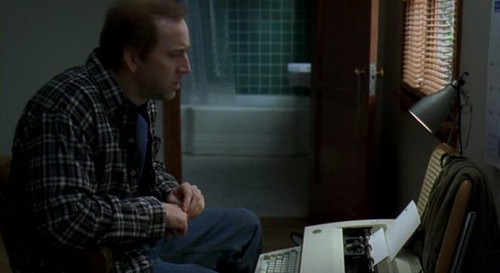
Why It’s Great:
- Well, check out the plot.
- Nicholas Cage – I’m so confused about how I feel about Nicholas Cage now that I can’t even remember how I used to; was he the annoying guy who always seemed to choose great films, or was he the basically decent actor who always got stuck in awful ones? Now that he’s been in Bringing Out The Dead and this, and I realise I really do like Con Air, I think I just plain like him. He’s fantastic in this, as both Charlie and Donald Kaufman, who spend a lot of time on screen together. You can’t make yourself believe for a second that they’re the same person, even though no attempt is made to distinguish them appearence-wise, beyond their wearing different clothes. The two roles would make a good litmus test for actors in general – can they make two identical-looking characters unassimilatably different? He can, and it’s a spectacular film, so he must be good.
- It’s hilarious. Not just Charlie’s self-loathing and Donald’s awful ideas, but the insane turns it takes toward the end, and the whole absurdly self-referential interaction between plot and genre.

A Quote: “Oh my God, I’ve written myself into my screenplay.” “That’s kind of weird, huh?” “It’s self-absorbed, it’s narcissistic, it’s solipsistic, it’s pathetic! I’m pathetic! I’m fat and pathetic!”
Something Like… Oh my God, I’ve written myself into my plot summary. It’s smarmy, it’s arrogant, it’s demeaning to the film, it’s pathetic! I’m pathetic! I’m stupid and pathetic!
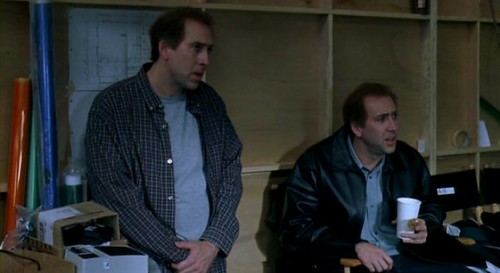
Grosse Pointe Blank
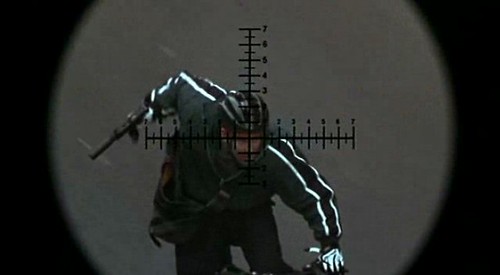
Genre: uh… romantic hitman comedy?
Stars: John Cusack, Minnie Driver, Dan Ackroyd, Jeremy Piven, Michael Cudlitz, Alan Arkin (Catch 22), Joan Cusack, Hank Azaria.
Plot: a hitman is hired to do a job in his hometown at the time of his ten year high-school reunion, and on the advice of his psychiatrist decides to attend and try to reconcile with the girlfriend he abandoned for a decade without a word, and maybe not kill anyone for a while.
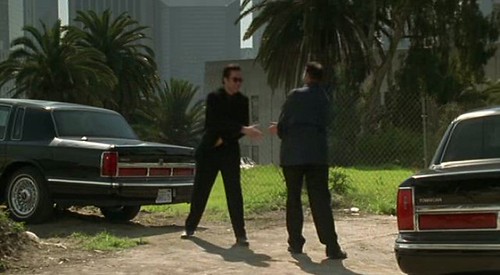
Why It’s Great:
- John Cusack.
- Both the electronic score by Joe Strummer and the all-eighties soundtrack are fantastic in their own rights, -and- brilliantly used. I Can See Clearly Now makes the opening credits and first scene unforgettably cool, and later on Mirror In The Bathroom accompanies a fight scene brilliantly.
- Assassination is inescapably appealing, and several of the gunfights are great – especially the final one, which features a frying pan.
- You’ll notice a second Cusack in the cast listing – there are actually four Cusacks in it altogether. I haven’t worked out who Bill is yet, and Ann’s appearence is very brief, but Joan is brilliant. She often plays significant roles in John’s films – even playing his character’s sister in Say Anything – and no-one cries nepotism because she’s really, really good.
- Jeremy Piven is always great, but this is his best character ever. I know you haven’t heard of him, but he was in the horrible Very Bad Things, and you’d probably recognise him if he was pointed out to you. Some of his quotes aren’t the best on paper, but when he says them, the “Ten years!” and “I was looking for a little validation on my life, but I guess I came up short” lines are some of the best in the film, and it’s a film of great lines.
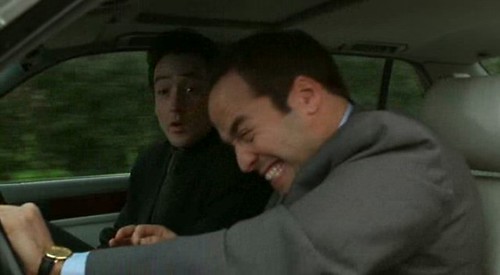
Quotes:
Waitress: What would you like in your omlette?
Blank: Nothing in the omlette, nothing at all.
Waitress: Technically that's not an omlette.
Blank: Look, I don't want a semantic argument about it, I just want the protein.
Grocer: Easy there, chief. I don't see hollow-point wound care on the menu.
Paul: I'll see you at the 'I've-Peaked-and-I'm-Kidding-Myself' party.
Blank: Debi's house.
Paul: Kinda crept up on you, didn't it?
Blank: No, you drove us here.
Paul: ... Yep.
Clips: school.avi (2MB)
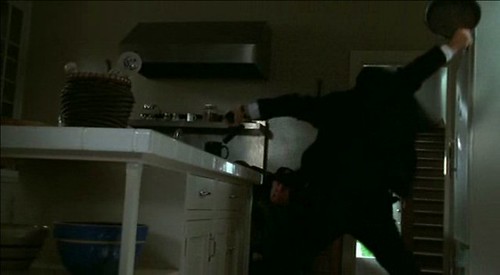
Memento
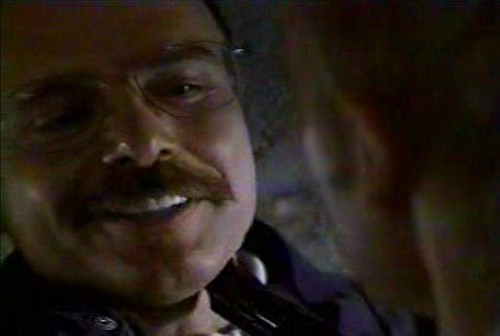
Genre: psychological thriller.
Stars: Guy Pearce (apparently in Neighbours at one point), John Pantoliano (the traitor in The Matrix), Carrie-Anne Moss.
Plot: an insurance claims investigator loses the ability to form new memories when he’s hit from behind during a struggle with a man he finds raping his wife, and tries to track down the second man with notes, tattoos and the help of a suspicious policeman friend. Half of the scenes are shown in reverse order, so that the film ends in the middle of its plot’s timeline.

Why It’s Great:
- The actual plot is astonishingly complicated and mind-blowingly clever.
- The intricate and beautiful scene-splicing interacts with the web of deceit and confusion brilliantly, unpicking it lie by lie.
- The two main characters are superbly written and are acted so compellingly that I still find them fascinating now, having seen it at least eight times.
- The fact that every scene starts with you having no idea what came before it mimics the protagonist’s condition cleverly, unravelling the plot in all the right backwards steps without keeping you in the dark about anything he knows.
- Although the themes are dark and even chilling, the atmosphere is mainly just exciting, and the dialogue and even plot are hilarious in parts.
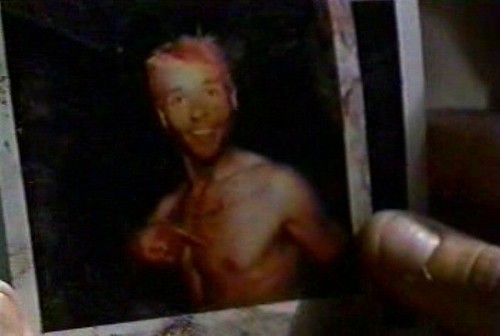
Timeline:
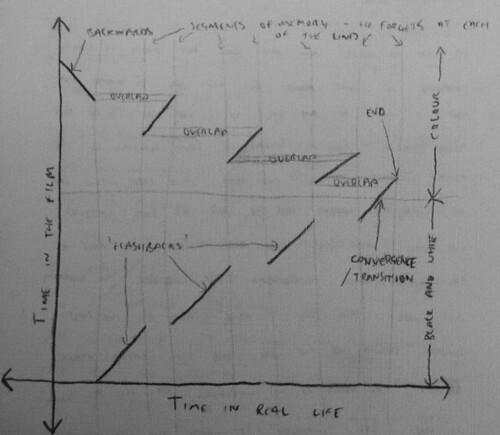
Quotes:
Lenny: (running) Okay, so what am I doing? (Seeing another man running) Oh, I'm chasing this guy. (The running man opens fire) No, he's chasing me.
LA Confidential
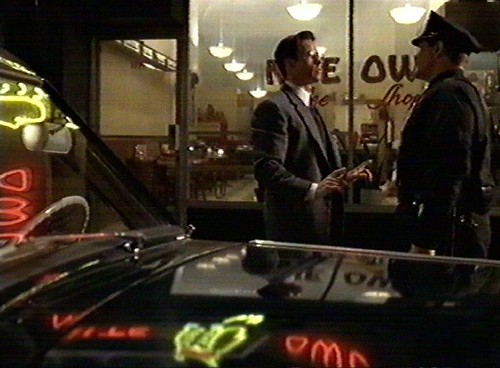
Genre: noir thriller.
Stars: Guy Pearce, Russell Crowe, Kevin Spacey, Danny DeVito, James Cromwell, David Strathairn, Kim Basinger, Ron Rifkin.
Plot: three Mexican kids are arrested for a coffeeshop massacre, but neither the straight-arrow arresting officer nor the violent colleague he hates so much think the case has been solved. Meanwhile, a reknown but low-ranking cop with ties to a popular TV show investigates a smut lead he can’t work out, but which he’s starting to think is connected.
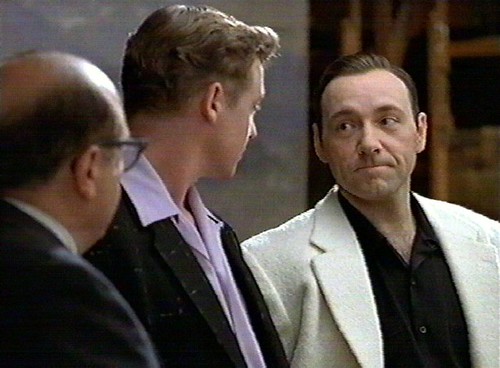
Why It’s Great:
- Not only is it based on a James Ellroy book, it’s a superb, Ellroy-esque version of it – despite not being written by James Ellroy. Ellroy himself commented, in very much his own words, “I can’t fucking believe it.”
- Ellroy-esque means mind-bogglingly complicated, subtle and dark. Typically for him, LA Confidential hinges on human weakness and corruption, scandal, drugs, ambition, revenge, hollowness, regret, and anger.
- The three leads and James Cromwell are incredible – the best performances I’ve ever seen from him or Spacey, both brilliant at their worst. The idea of different personality types coming together in the face of a greater evil is hardly novel, but their personalities are so profoundly convincing that it still feels like a revelation. It also helps that the moment Crowe and Pearce realise they’re on the same side, Crowe is in the middle of beating Pearce’s head against the corner of a filing cabinet. In the end, it’s a friendship that arises when it becomes clear they don’t have time to hit each other anymore. And it only becomes jovial when they’re both convinced they’re going to die.
- In fact Cromwell is probably the star of the film, as the brilliantly conceived Captain Dudley Smith, the only common thread in the three books and perhaps Ellroy’s biggest character. His key moment in the film – you know it if you’ve seen it – is extraordinary cinema.
The 40’s LA atmosphere is impeccable, and the whole thing has an amazingly sylish elegance. - The action is so expertly directed, so immediately gripping and volatile, that a simple hotel shoot-out makes The Matrix’s lobby scene look pathetic. These are gunfights that respect the fact that line-of-sight means death for one or the other party within a second. Death is vicious and sudden. Every shot has a serious, brutal consequence.
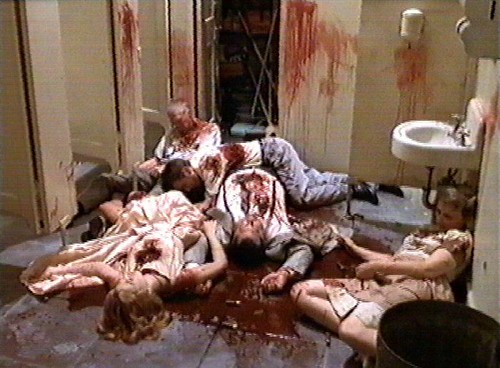
Quotes:
Scandal-Rag Journalist: Patchett's what I call 'twilight': he ain't queer and he ain't red. He can't help me in my quest for prime sinuendo.
Coroner: Stomach of the week from a motel homicide: the unemployed actor had frankfurter, french fries, alcohol and sperm.